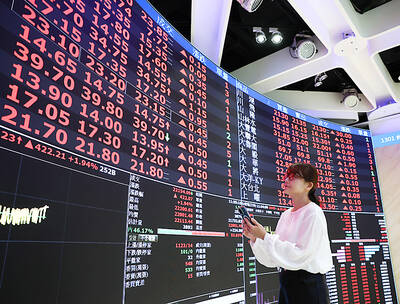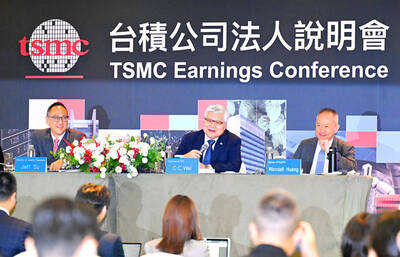Infineon AG, Europe’s second-largest chipmaker, filed a patent-infringement complaint that seeks to block US imports of computer-memory chips by Japan’s Elpida Memory Inc.
In a complaint filed on Feb. 19 with the US International Trade Commission (ITC) in Washington, Infineon claims Elpida infringes four patents related to dynamic random access memory (DRAM) chips.
TECHNOLOGY
“Infineon has always been at the forefront of advanced semiconductor processing technologies,” Hermann Eul, an Infineon management board member, said in a statement on Monday.
“We will protect our intellectual-property rights, which arise from our commitment to cutting-edge research and development,” Eul said.
Should it win the case, Infineon might be able to shut Elpida, Japan’s biggest DRAM maker, out of the US market.
The global market for DRAM chips is expected to surge by more than 40 percent this year to US$31.9 billion as prices rise and demand for personal computers recovers, research firm iSuppli Corp said last week.
In addition to Tokyo-based Elpida, the complaint names companies including the Taiwanese firms A-Data Technology Co (威剛科技), Apacer Technology Inc (宇瞻科技) and Transcend Information Inc (創見資訊), as well as Kingston Technology Co of Fountain Valley, California; Buffalo Technology Inc of Nagoya, Japan, and Austin, Texas; Corsair Memory of Fremont, California; and Mushkin Inc of Englewood, Colorado, a notice posted on the ITC’s Web site said.
ELPIDA CHIPS
Those companies make memory modules that have Elpida DRAM chips mounted on circuit boards for use in personal computers, laptops and other electronics, according to the complaint.
The Japanese company sold US$715 million worth of DRAM products in North America in the year ended March 31, according to the complaint. Elpida’s chips were made mostly in Japan, with some manufactured in Taiwan.
The patents cover ways to make the DRAM chips, including methods to improve the creation of contacts and interconnects that conduct electricity on the circuits and increased accuracy of the different layers on the chips.
Infineon reported its second consecutive quarterly profit after collective losses of more than 3.9 billion euros (US$5.3 billion) in the 10 previous quarters.
The company had to raise funds from shareholders, borrow money and sell assets to stay afloat last year.
Separately, Infineon and the IG Metall Bayern union reached a wage agreement valid from Monday to Dec. 31 of next year for the area of Bavaria.
The agreement includes a wage increase of 2.2 percent effective Oct. 1 of this year and a further increase of 2 percent as of May 1 of next year, the company said in an e-mailed statement yesterday.

UNCERTAINTIES: Exports surged 34.1% and private investment grew 7.03% to outpace expectations in the first half, although US tariffs could stall momentum The Chung-Hua Institution for Economic Research (CIER, 中華經濟研究院) yesterday raised its GDP growth forecast to 3.05 percent this year on a robust first-half performance, but warned that US tariff threats and external uncertainty could stall momentum in the second half of the year. “The first half proved exceptionally strong, allowing room for optimism,” CIER president Lien Hsien-ming (連賢明) said. “But the growth momentum may slow moving forward due to US tariffs.” The tariff threat poses definite downside risks, although the scale of the impact remains unclear given the unpredictability of US President Donald Trump’s policies, Lien said. Despite the headwinds, Taiwan is likely

READY TO BUY: Shortly after Nvidia announced the approval, Chinese firms scrambled to order the H20 GPUs, which the company must send to the US government for approval Nvidia Corp chief executive officer Jensen Huang (黃仁勳) late on Monday said the technology giant has won approval from US President Donald Trump’s administration to sell its advanced H20 graphics processing units (GPUs) used to develop artificial intelligence (AI) to China. The news came in a company blog post late on Monday and Huang also spoke about the coup on China’s state-run China Global Television Network in remarks shown on X. “The US government has assured Nvidia that licenses will be granted, and Nvidia hopes to start deliveries soon,” the post said. “Today, I’m announcing that the US government has approved for us

The National Stabilization Fund (NSF, 國安基金) is to continue supporting local shares, as uncertainties in international politics and the economy could affect Taiwanese industries’ global deployment and corporate profits, as well as affect stock movement and investor confidence, the Ministry of Finance said in a statement yesterday. The NT$500 billion (US$17.1 billion) fund would remain active in the stock market as the US’ tariff measures have not yet been fully finalized, which would drive international capital flows and global supply chain restructuring, the ministry said after the a meeting of the fund’s steering committee. Along with ongoing geopolitical risks and an unfavorable

DEMAND: The forecast did not factor in potential increases from lifted US restrictions on Nvidia’s H20 chips to China, which TSMC CEO C.C. Wei described as ‘good news’ Taiwan Semiconductor Manufacturing Co (TSMC, 台積電), a major chip supplier to Nvidia Corp, yesterday raised its revenue growth forecast for this year to 30 percent in US dollar terms, thanks to exceptionally strong demand for artificial intelligence (AI) and high-performance computing (HPC) applications. The new revenue growth forecast surpasses the 25 percent expansion estimated by TSMC three months ago and beat almost all industry analysts’ expectations. Booming AI demand helped propel the chipmaker’s net profit by 60.7 percent last quarter to a record high of NT$398.27 billion (US$13.54 billion), from NT$247.85 billion a year earlier. That represented a sequential increase of 10.2